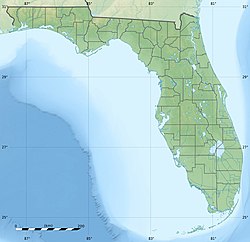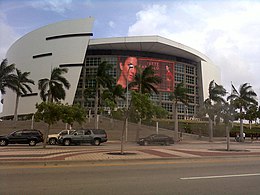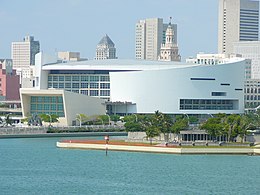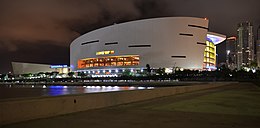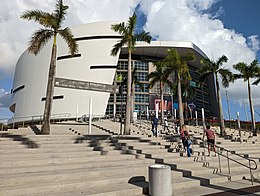 | |
 | |
| Former names | American Airlines Arena (1999–2021) FTX Arena (2021–2023) Miami-Dade Arena (2023) |
|---|---|
| Address | 601 Biscayne Boulevard |
| Location | Miami, Florida, U.S. |
| Coordinates | 25°46′53″N 80°11′17″W / 25.78139°N 80.18806°W |
| Public transit | |
| Parking | 939 parking spaces |
| Owner | Miami-Dade County |
| Operator | Basketball Properties Ltd. |
| Capacity | Basketball: 19,600; 16,500 (Without upper levels) Concerts: 5,000–20,021 Hockey: 14,447 |
| Surface | Multi-surface |
| Construction | |
| Broke ground | February 6, 1998 |
| Opened | December 31, 1999 |
| Construction cost | US$213 million ($390 million in 2023 dollars[1]) |
| Architect | Arquitectonica 360 Architecture (formerly Heinlein Schrock Stearns) |
| Project manager | Parsons Brinckerhoff |
| Structural engineer | Thornton Tomasetti |
| Services engineer | Flack+Kurtz[2] |
| General contractor | Morse-Diesel/Odebrecht/Facchina[3] |
| Main contractors | John J. Kirlin, LLC[4] Simpson Constructors[5] Crown Corr Inc.[6] |
| Tenants | |
| Miami Heat (NBA) (2000–present) Miami Sol (WNBA) (2000–2002) | |
| Website | |
| kaseyacenter | |


Kaseya Center (/kəˈseɪ.ə/ kə-SAY-ə) is a multi-purpose arena on Biscayne Bay in Miami, Florida. The arena was previously named American Airlines Arena from opening in 1999 until 2021, FTX Arena from 2021 until 2023 following the bankruptcy of FTX, and Miami-Dade Arena during an interim period in 2023. Since April 2023, the naming rights to the arena are owned by Kaseya under a 17-year, $117.4 million agreement.[7]
The arena has capacity for 19,500 people,[8] including 2,105 club seats, 80 luxury suites, and 76 private boxes. Additionally, for more intimate performances, The Waterfront Theater, the largest indoor theater in Florida, is within the arena complex, seating between 3,000 and 5,800 patrons. The theater can be configured for concerts, worship events, family events, musical theatre shows and other stage productions. American Airlines, which has a hub at Miami International Airport, maintains a travel center at the venue.
The arena is directly served by the Miami Metrorail at Government Center station via free transfers to Metromover Omni Loop, providing direct service to Freedom Tower station and Park West station stations, within walking distance. It is also within walking distance from the Historic Overtown/Lyric Theatre station.
The arena has 939 parking spaces, with those spaces reserved for premium seat and Dewar's 12 Clubhouse ticket holders during Heat games. ParkJockey manages the arena's on-site parking.[9][10]
History
[edit]In 1997, the owners of the Miami Heat of the National Basketball Association, which then played in the eight-year-old, publicly financed Miami Arena, threatened to move to Broward County unless they were given the $38 million parcel of land for the new arena by Alex Penelas, then-mayor of Miami. The agreement provided that the county receive 40% of annual profits of the arena, which was above $14 million.[11]
Construction began on February 6, 1998.[8] The arena was designed by Arquitectonica[12] and 360 Architecture.
Kaseya Center opened as the American Airlines Arena on December 31, 1999, and its construction cost was $213 million. Architectural design team members included George Heinlein, Cristian Petschen, Reinaldo Borges, and Lance Simon. The arena's opening was inaugurated with a concert by Gloria Estefan.[13] Two days later, on January 2, 2000, the Miami Heat played its first game in the new arena by defeating the Orlando Magic 111–103.[14]
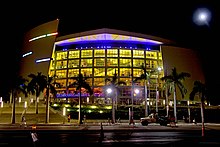
As part of its sponsorship arrangement, American Airlines had a giant aircraft painted atop the arena's roof, with an American Airlines logo in the center. The design was visible from airplanes taking off and landing at Miami International Airport, where American has a hub. The arena also has luxury skyboxes called "Flagship Lounges", a trademark originally used for American's premium-class lounges at certain airports. Until the date that the arena was renamed in 2020–2021, the arena used the 1967-2013 logo of American Airlines.
The arena was sometimes referred to as "Triple-A" or "A3" (A cubed).[15]
The arena is known for its unusual scoreboard, designed by artist Christopher Janney and installed in 1998 as part of the original construction. Drawing on the underwater anemone forms, the scoreboard also changes colors depending on the atmosphere.[16]
For concerts in an arena configuration, end stage capacity is 12,202 for 180° shows, 15,402 for 270° shows, and 18,309 for 360° shows. For center stage concerts the arena can seat 19,146.[citation needed]
WTVJ, the city's NBC-owned and operated station in Miami, had their Downtown Miami Studios in the back of the arena from 2001 until 2011.[citation needed]
In 2013, the Miami Heat paid rent on the arena for the first time pursuant to the percentage rent agreement with the county; the payment was $3.32 million.[17][18]
On September 10, 2019, American Airlines said that it would not renew its naming rights upon expiration at the end of 2019.[19][20][21][22] The American Airlines Arena court decals were removed from the Heat's floor before the 2020–21 season and replaced temporarily with the logo of team/league vehicle sponsor Kia Motors.
In March 2021, FTX acquired the naming rights to the arena in a $135 million, 19-year agreement.[23][15] The NBA approved the deal in early April, and the arena was renamed FTX Arena in June 2021, just after the Miami Heat were swept by the Milwaukee Bucks in the first round of the 2021 NBA playoffs.[24][25]
As part of the bankruptcy of FTX, the naming rights agreement was terminated effective January 2023.[26][27][28][29] After three months under the temporary name of Miami-Dade Arena, a 17-year naming rights agreement was reached with Miami-based software company Kaseya to name the arena Kaseya Center beginning April 2023.[30] Under the terms of the contract, the county receives the majority of the naming rights revenue while the Heat receives $2 million annually.[30]
Notable events
[edit]Circus
[edit]In January 2017, the closing of the Ringling Bros. and Barnum & Bailey Circus was announced after shows at the arena.[31][32]
Basketball
[edit]
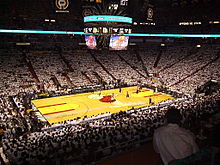
- The then-named American Airlines Arena, along with the American Airlines Center in Dallas, hosted the 2006 NBA Finals and the 2011 NBA Finals as the Miami Heat played the Dallas Mavericks. The Heat won the championship in 2006 in Dallas and the Mavericks won in the 2011 rematch in Miami. These series were the first and second appearances in the NBA Finals for both franchises. As the airline held naming rights to both venues, people nicknamed the matchups as the "American Airlines series".
- The arena hosted the 2012, 2013 and 2014 NBA Finals along with the Chesapeake Energy Arena in Oklahoma City in 2012, and the AT&T Center in San Antonio in 2013 and 2014. In 2012, the Heat defeated the Oklahoma City Thunder in five games, winning the championship at home. In 2013, the Heat played the San Antonio Spurs. The Heat faced a 3–2 series deficit returning to Miami but won games 6 and 7 to defend their championship. In 2014, the Spurs defeated the Heat in five games in San Antonio and won the championship and the rematch.
- The arena hosted the 2023 NBA Finals under its current name of Kaseya Center, along with the Ball Arena in Denver as the Heat played the Denver Nuggets. The Nuggets defeated the Heat in five games to win their first championship.
- Since 2015, the arena has hosted the annual Hoophall Miami Invitational, an NCAA Division I college basketball showcase event.
Professional wrestling
[edit]The arena hosted Uncensored (2000), the World Championship Wrestling WCW Uncensored pay-per-view. Four major WWE pay-per-view events have been held at the arena: the Royal Rumble in 2006, Survivor Series in 2007 and 2010, and WWE Hell in a Cell in 2013. It has also hosted various episodes of WWE Raw and WWE SmackDown.
Mixed martial arts
[edit]On April 25, 2003, the arena hosted the first Ultimate Fighting Championship event in Florida, UFC 42: Sudden Impact.[33] The UFC returned to the arena after twenty years on April 8, 2023, for UFC 287: Pereira vs. Adesanya 2.[34] The promotion returned again on March 9, 2024 for UFC 299: O'Malley vs. Vera 2.[35]
Other sports
[edit]- The arena features a regulation NHL ice rink, though the arena has never hosted the sport, as the Florida Panthers have played in Sunrise at the Amerant Bank Arena since October 1998. The rink, lined with a smaller wall, instead accommodates ice shows such as Disney on Ice.[36]
- The Waterfront Theatre at the arena hosted the 2020 NFL Honors on February 1, 2020, which was broadcast by Fox Broadcasting Company.
Music
[edit]Notable musicians to perform at the arena include Gloria Estefan, Phish,[37] Shakira, Dua Lipa, Mariah Carey, Cher, Kelly Clarkson, Clay Aiken, Britney Spears, U2, Soda Stereo, Kanye West, Tina Turner, Celine Dion, Justin Bieber, Lady Gaga, Coldplay,[38] Jennifer Lopez, Madonna, Miley Cyrus, Hillsong United, Justin Timberlake, One Direction, Katy Perry, Demi Lovato, Ariana Grande,[39] Chris Brown, Janet Jackson, Taylor Swift, The Weeknd, Rihanna,[40] Selena Gomez,[41] Maroon 5, Adele,[42] Carrie Underwood, Jimmie Allen, Ricardo Arjona,[43] RBD,[44] and Tini.
The 2004 MTV Video Music Awards and the 2005 MTV Video Music Awards, Sensation, as well as the For Darfur benefit concert were held at the arena.
Awards ceremonies
[edit]The arena hosts the annual Premio Lo Nuestro Latin music awards since 2001. The awards are held on a Thursday night in late February. The Kaseya Center hosted the Latin Grammy Awards in 2003 and in 2020.
Gallery
[edit]-
The arena during the 2004 NBA Playoffs
-
Front view of the arena in July 2010
-
View from Biscayne Bay
-
View from the north at night
-
The arena at night
-
The arena in March 2022
See also
[edit]References
[edit]- ^ 1634–1699: McCusker, J. J. (1997). How Much Is That in Real Money? A Historical Price Index for Use as a Deflator of Money Values in the Economy of the United States: Addenda et Corrigenda (PDF). American Antiquarian Society. 1700–1799: McCusker, J. J. (1992). How Much Is That in Real Money? A Historical Price Index for Use as a Deflator of Money Values in the Economy of the United States (PDF). American Antiquarian Society. 1800–present: Federal Reserve Bank of Minneapolis. "Consumer Price Index (estimate) 1800–". Retrieved February 29, 2024.
- ^ "Westchester Reform Temple, Rogers Marvel Architects". www.architecturalrecord.com.
- ^ Guthrie, Amy (June 27, 2014). "Mexico's ICA Barrels into U.S. with Facchina Construction Deal". The Wall Street Journal.
- ^ AmericanAirlines Arena Archived 2011-09-14 at the Wayback Machine Kirlin
- ^ Past Projects Archived 2012-04-02 at the Wayback Machine Simpson Constructors
- ^ AmericanAirlines Arena Crown Corr
- ^ "Heat inks partnership deal with Kaseya". National Basketball Association. April 4, 2023.
- ^ a b "Case Study: AmericanAirlines Arena, Home of the Miami HEAT" (PDF). Natural Resources Defense Council.
- ^ "The HEAT Group Teams Up With New Parking App, ParkJockey" (Press release). National Basketball Association. December 4, 2014.
- ^ Sentenac, Hannah (October 30, 2014). "Avoid Parking Hell at Miami Heat Games With ParkJockey App". Miami New Times.
- ^ Garcia-Roberts, Gus (December 23, 2010). "Miami Heat owner pays no rent for his arena". Miami New Times.
- ^ "AmericanAirlines Arena NRG Solar Canopy". Architect Magazine. April 4, 2016.
- ^ "MIAMI'S OWN GLORIA". Sun Sentinel. December 28, 1999.
- ^ "Heat Win Debut In New Arena". CBS News. January 2, 2000.
- ^ a b Vela, Hatzel; Torres, Andrea (March 26, 2021). "NBA still needs to approve Miami-Dade's $135M deal with FTX to rename Miami Heat's home". WPLG.
- ^ "NEW SCOREBOARD IS ARMED TO ASTOUND FANS". Sun Sentinel. August 18, 1998.
- ^ Hanks, Douglas (November 22, 2013). "Heat cuts first rent check in 13 years for AA Arena". Miami Herald.
- ^ Petchesky, Barry (November 22, 2013). "For The First Time Ever, The Miami Heat Paid Rent". Deadspin.
- ^ Scheckner, Jesse (September 10, 2019). "it won't be called AmericanAirlines Arena next year". Miami Today. Retrieved September 10, 2019.
- ^ Arnold, Kyle (September 11, 2019). "American Airlines giving up naming rights to Miami arena". The Dallas Morning News.
- ^ Winderman, Ira (September 11, 2019). "American Airlines not renewing naming rights to Heat arena". South Florida Sun-Sentinel.
- ^ Alvarez, Stefan (September 12, 2019). "Miami Heat: AmericanAirlines Arena to be renamed". All U Can Heat. FanSided. Retrieved September 12, 2019.
- ^ "It's Official! Miami Heat Home To Be Named FTX Arena". WFOR-TV. March 26, 2021.
- ^ "Welcome To FTX Arena" (Press release). National Basketball Association. June 4, 2021.
- ^ Vela, Hatzel (April 7, 2021). "NBA approves deal to name Miami Heat's home building FTX Arena". WPLG.
- ^ Winderman, Ira (November 11, 2022). "Heat, Miami-Dade terminate FTX deal, seek new arena naming rights; FTX branding already being removed". South Florida Sun-Sentinel.
- ^ "Miami Heat's home to be temporarily called Miami-Dade Arena". ESPN. January 13, 2023.
- ^ "Miami HEAT on Instagram: "Miami-Dade County and the Miami HEAT have released the following statement"". Instagram.
- ^ Reynolds, Tim (January 11, 2023). "Miami-Dade County wins right to strip FTX name off Heat arena". National Basketball Association.
- ^ a b "Heat arena, formerly FTX, renamed Kaseya Center on 17-year deal". ESPN. April 4, 2023.
- ^ Solis, Steph (January 15, 2017). "Ringling Bros. circus closing after 146 years". USA Today.
- ^ LUSH, TAMARA (January 14, 2017). "APNewsBreak: Ringling Bros. circus to close after 146 years". Associated Press.
- ^ Duffy, Ben (April 25, 2020). "This Day in MMA History: April 25". Sherdog. Retrieved April 9, 2023.
- ^ Raimondi, Marc (April 9, 2023). "Israel Adesanya knocks out Alex Pereira to recapture UFC title". ABC News. Retrieved April 9, 2023.
- ^ Raimondi, Marc (March 10, 2024). "Sean O'Malley puts on show, routs Marlon Vera at UFC 299". ABC News. Retrieved March 11, 2023.
- ^ "Arena description page on Thornton Tomasetti website". Thornton Tomasetti. January 1999.
- ^ "Phish at American Airlines Arena". Miami New Times. January 1, 2010.
- ^ Dworken, Arye (June 28, 2012). "Coldplay's Mylo Xyloto Tour at American Airlines Arena June 29". Miami New Times.
- ^ Lindner, Emily (March 28, 2015). "Justin Bieber Joined Ariana Grande Onstage And She Rapped Big Sean's Part On 'As Long As You Love Me'". MTV. Archived from the original on April 7, 2023.
- ^ Sonawane, Vishakha (March 16, 2016). "Rihanna Performs Raunchy Moves With Drake At 'Anti' Tour Amid Dating Rumors". International Business Times.
- ^ "Selena Gomez performs at American Airlines Arena". WSVN. June 11, 2016.
- ^ Crandell, Ben (October 25, 2016). "Review: Adele dazzles Miami crowd, Hillary Clinton". South Florida Sun-Sentinel.
- ^ Flores, Griselda (July 1, 2023). "Karol G Breaks Record With 'Today' Performance & More Uplifting Moments in Latin Music". Billboard.
- ^ "Todo lo que debes saber sobre los conciertos de RBD en Miami como parte de su gira "Soy Rebelde Tour"". Miami Hispano. September 21, 2023.
External links
[edit]
| |
| Franchise | |
| Arenas | |
| Personnel |
|
| G League affiliate | |
| Retired numbers | |
| NBA championships | |
| Rivalries | |
| Culture and lore | |
| Eastern Conference |
| ||||||
|---|---|---|---|---|---|---|---|
| Western Conference |
| ||||||

